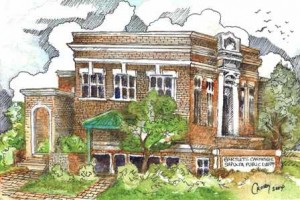From Liverpool to New York, 3 June 1844
February 21st, 2011 Posted in Conversation, On the Internet | Comments OffOn last week’s episode of “Who Do You Think You Are?” Rosie O’Donnell traveled to County Kildare in Ireland. Her great-great-grandparents had lived there in poverty just after the Irish Potato Famine until the early 1850’s, when they emigrated to Canada and eventually came to the United States, settling in New Jersey. Watch the episode, or others that have already aired, at http://www.nbc.com/who-do-you-think-you-are/.
Sometimes when I have a few minutes, I spend some time online, searching on the website of the program’s sponsor, Ancestry.com. After watching the show on Friday night I was in the mood for a little Irish searching — for my own great-great-grandparents who also reportedly came from “near Dublin, Kildare, Ireland.” County Kildare is, in fact, just outside of Dublin. And the parents of my mother’s grandmother, Anna Carr Regan, had left there around the time of the Irish Potato Famine, as had Rosie’s ancestors, Andrew Murtagh and Ann Doyle Murtagh, and their four children.
My mother had put together most of the dates and places several years ago. I opened the family view in my genealogy software file in Reunion (for the Macintosh), so that I could find what I needed as I searched. Patrick Carr, who lived and died in Cleveland, Ohio, was reportedly born in 1805 and his wife, Bridget in either 1814 or 1824. Their first two children, both girls, were supposed to have been born in Ireland in 1842. The eldest was Mary and the next Bridget. My mother thought that the third child, Kathleen or Katherine, was either born in Ireland or in New York, in roughly 1848, and the fourth, also a daughter, named Helen, was born in about 1849 in Ohio. I was a little fuzzy on the dates we had established that the family was in Cleveland, but I was pretty sure that the date of immigration could have been anywhere from the early 1840’s to maybe 1856, when Anna Carr was born. We were not sure about the dates or places of birth of Katherine and Helen, and we still do not have the maiden name of Patrick’s wife — unless it really is Carr — what one vital record showed for mother’s maiden name: Bridget Carr.
Patrick Carr is not an uncommon name and when my mother and I were in the thick of the Carr research several years ago, the New York Passenger Arrivals were not indexed to the extent that they are today. Of course, New York was not the only port, but it seemed to be the most likely for this Cleveland family, especially because of the family tradition. Searches on Ancestry.com for Patrick Carr resulted in lots of hits for the wrong Patrick Carr, but eventually I was able to find one passenger list that included all four members of the Carr family that immigrated. I did this by using one of my Power Hitter tricks — I searched for others of less common names who were probably in the same record, in order to locate the record.
Genealogists can often find a record of someone with the same name as their ancestor, but what they really need is something in the record that can help them to identify that they have found a record of the actual ancestor. I knew that if I found a Patrick Carr, I wouldn’t be sure whether he was my Patrick Carr unless he was with his wife Bridget, and better yet if they were together and had some of their children with them. I located this little family after a little perseverance:
- Pat Carr 30
- Bridget Carr 38
- Mary Carr 2
- Bridget Carr Inft
And I was glad that they had immigrated together. The arrival date was 4 Jun 1844 and the ship was the Hannibal, which had departed Liverpool and arrived in New York City. This was too early for the Carrs to have been processed at Ellis Island (which wasn’t established until 1892), or to have seen the Statue of Liberty in the New York Harbor (because it wasn’t erected until 1886). They did probably enter through Castle Garden, at Battery Park in New York City.
Looking back to try to determine why I wasn’t able to find Patrick Carr very quickly, I think there were a few reasons. First, there is a significant difference in the estimated date of birth. Instead of 1805, this Pat Carr was 30 in 1844, or born in about 1814. In addition, rather than Patrick Carr, he was listed as Pat Carr. And, when I searched the index to New York, 1820-1850 Passenger and Immigration Lists for all Patrick Carrs, I found that the one who arrived on the Hannibal was 28th on the list.
So how did I find the family without looking at every Patrick Carr in the results list? The name Bridget is not as common as is Patrick, so I searched for Bridget Carr, born in about 1842, and for her sister, Mary, born in about 1842, and compared the results lists for the two. I found the Hannibal on both results lists and then checked the digital image to see whether they had parents, Patrick and Bridget. Without the rest of the family, the age of Bridget (the mother, at 38), or the age of Pat (30) would seem to eliminate them, but considering that the information about their daughters is what we would expect, and given that the 3 June 1844 falls within a likely date range for their migration, I believe that I have found the boat — and I have called my mother to give her the news. I will continue to search for all related records, as good genealogists do, to either strengthen the case or to disprove it. I hope to establish that this family is mine, so that I can pursue them in County Kildare. But if it isn’t, then I’ll keep looking until I do find them.
I’ll be watching “Who Do You Think You Are?” again this Friday night, highlighting Kim Cattrall. If you miss it, be sure to watch the online episode.




